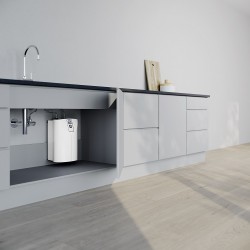Mark McManus, Managing Director of Stiebel Eltron UK, a heating product manufacturer, picks out the options available to the modular sector to ensure their buildings meet the impending regulation changes in the Future Homes Standard.
Modular buildings are some of the most sustainable building types available, using two thirds less energy to manufacture compared to traditional building construction and have long been hailed a solution to the UK’s building conundrum – both in terms of the speed and quality of housing delivery and greener building practices. And the UK’s net zero ambitions have placed even greater emphasis on the offsite industry’s ability to play in a major role in meeting the impressive carbon reduction targets.
Looking at the manufacturing and construction practices, the modular sector has invested considerable time and resource into making the industry a leader in more sustainable building methods. Factory-controlled conditions have helped to drastically minimise carbon emissions: modular buildings produce 10-15% less construction waste compared to traditional construction sites and the emissions caused by vehicle transport going to and from sites is up to 70% less in modular projects, with each delivery to a modular factory also delivering more material in bulk, reducing site traffic by up to 90%.
Meanwhile the buildings themselves, which must uphold the same Building Regulations standards as traditional buildings, are set to improve their energy efficiency standards even further. The impending Building Regulations Part L1A and the introduction of the Future Homes Standard in 2025 will require emissions from all newbuild homes to be reduced by more than a third, to effectively make them ‘net zero ready’ for the when the country is decarbonised. What’s more, homes will be required to have low-carbon heating from 2025, meaning they cannot run on fossil fuel heating like oil or natural gas. So, what heating solutions can modular housebuilders look to use now, in order to meet the changing Future Homes Standard regulations?
Electricity is a sustainable power source which is increasingly being generated through renewable energy solutions as more investment is put into sustainable energy sources. Compared to oil or gas heaters, they are also often simpler to install, take up less space and can be the cheaper alternative to run. This can make electric heating systems a failsafe option for modular developers looking for greener alternatives to meet the Future Homes Standard requirements.
There is an electric heater to fit almost every situation – compact fan heaters, for example, that are specifically designed for rapid response heating in portable buildings. Meanwhile our SNE 5t ECO all-electric water, which is the first fully electronic small water storage heater available in the UK, has a precise temperature selection, user-friendly digital controls and an ECO mode to save energy. The built-in programmable timer makes it ideal for modular buildings being used as site offices or temporary classrooms, for example, where the building is in intermittent use.
These are only a couple of examples of greener heating solution available for modular builders and building users, and more and more investment is being put into product development every day to bring even more sustainable options to the market. But it shows that even now, four years before the Future Homes Standard regulations are set to be introduced, there are options on the market for modular builders to meet the lowcarbon heating requirements. The industry has, and will continue to be, a front runner in green building methods. Let’s make sure the same can be said about their heating solutions.
To read full article and for more news, check out the latest Offsite Magazine









